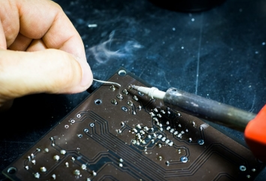

China's suddenly announces curbs on exports of gallium and germanium
China’s sudden restriction on exports of two critical components used for making a range of high-end equipment–from radars to solar panels— could dent global supply chains but also reinforce the world’s resolve to find alternatives.
Notably, the announcement has come just hours before US Treasury Secretary Janet Yellen’s visit to Beijing. Global Times, the noisy tabloid of the Communist Party of China (CPC) says the restrictions will mainly target the US military industry.
“Gallium arsenide (GaAs) and gallium nitride (GaN) are the most basic materials in the making of the transmit receive modules on active electronic scanning array (AESA) radars, which are widely used on modern warplanes, warships and ground installations,” the daily said citing an expert.
In any case, in the near future, the dent in supply may push up prices of these materials. While global markets may find this sudden decision disruptive in many ways, they will eventually find alternate sources for these key elements—gallium and germanium. The decision could therefore end the dragon’s dominance in this sphere.
The decision has underscored the urgent need for the world business community to diversify their supply sources.
At present China produces about 60 per cent of the global germanium requirement and 80 per cent of gallium. Countries such as Canada, Belgium, Japan and Germany also have the ability to manufacture germanium. Gallium is also produced in Russia, South Korea, Ukraine and Germany.
From August 1, exporters dealing in these items would require prior approval of the government. It also said that certain items “meeting certain characteristics shall not be exported without approval.”
“In order to safeguard national security and interests, with the approval of the State Council, it is decided to implement export controls on items related to gallium and germanium,” the Ministry of Commerce (MOFCOM) and the General Administration of Customs (GAC) said in a statement.
Beijing on its part has said that the decision has been taken to protect the country’s national security.
The South China Morning Post noted that China may be trying to use this tactic as a bargaining tool. “If China chooses to weaponise these supply chains, it will greatly complicate the calculus in the US, EU and Asia in terms of reducing dependence on China,” Paul Triolo, a senior associate at the Center for Strategic and International Studies, a think tank in Washington, told the news organisation. The exercise to set up alternate supply sources, though has started, will take time to bear fruits.
Gallium is actually a by-product of alumina. In India, Hindalco Industries Ltd at Renukoot in Uttar Pradesh and National Aluminium Co. Ltd at Damanjodi, Odisha, had obtained this element in the past but its production has never been in focus.
As India now aims to become a global hub for semiconductors, it needs to set up credible supply chains of critical raw materials while boosting its own production.
The need for these items is set to rise globally. It is therefore prudent for the world business community to look at other reliable sources, and possibly invest more in India to build new supply chains.
Also read: Rare Earth Elements used for making electronic goods discovered in Andhra’s Ananthapur district
Prime Minister Narendra Modi interacted with members of the Indian diaspora here on Wednesday as…
The city of Hamburg in Germany is set to host the 11th edition of India…
The International Atomic Energy Agency (IAEA) has confirmed that two Iranian centrifuge production facilities, TESA…
The human rights department of the Baloch National Movement (BNM), Paank, has strongly condemned the…
In a major boost to India's coastal defence capabilities, the Indian Navy on Wednesday commissioned…
Volker Turk, the UN High Commissioner for Human Rights, on June 17 expressed concern over…